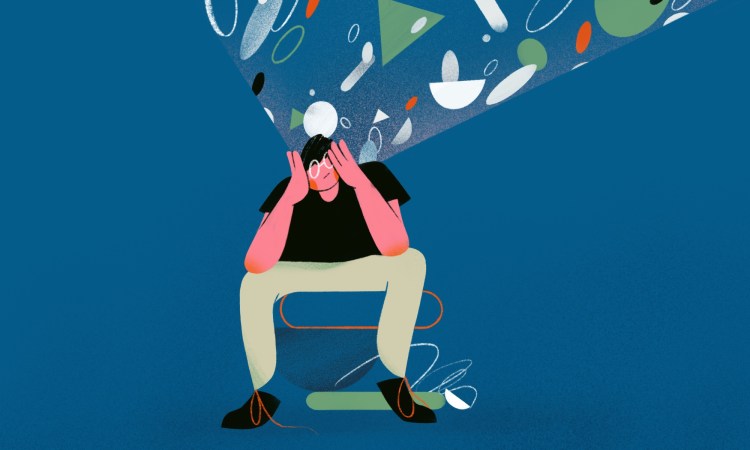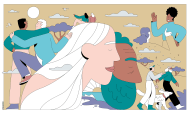
Not long ago, when I was somewhere in my mid-40s, I drove to Cambridge, Massachusetts, from Cape Cod and parked my car in a garage. I was scheduled to give a talk a couple of blocks away and had hoped to arrive earlier. Normally I take a photo of the floor number or the row letter whenever I park in a garage. But worried I was late, I raced out of there without getting a photo and, worse, without consciously registering where I had parked.
I arrived on time, gave my 45-minute talk, answered questions and signed books. When I returned to the garage, I walked to where I thought I had parked, but my car wasn’t there. I paced up and down ramps, becoming increasingly frustrated and hopeless. I was sure I had parked on the fourth floor, but maybe it was the third or the fifth? And did I park in section A, B or C? No idea.
I knew I was in the right garage, but that’s all. I was just about to report my car stolen when I stumbled upon it in 4B.
If we want to remember something, above all else we need to notice. And noticing requires two things: perception (seeing, hearing, smelling, feeling) and attention.
Relieved, embarrassed and sweating, I wanted to blame the whole experience on my memory, but the neuroscientist in me knew better. I couldn’t find my car not because I had a horrible memory, amnesia, dementia or Alzheimer’s — I couldn’t find my car because I never paid attention to where I had parked it in the first place.
If we want to remember something, above all else we need to notice. And noticing requires two things: perception (seeing, hearing, smelling, feeling) and attention.
Your memory isn’t a video camera, recording a constant stream of every sight and sound you’re exposed to — you can only capture and retain what you pay attention to. And since you can’t pay attention to everything, you’ll be able to remember some aspects of what is happening before you but not others.
Let’s say you’re standing in front of the glitzy and colossal Christmas tree in Rockefeller Center in New York City. You take in the visual information — the shape, the size, the colors of the lights — through receptors called rods and cones in the retinas of your eyes.
If you’re awake for 16 hours today, your senses are open for business for 57,600 seconds. That’s a lot of data. You simply can’t — and won’t — remember most of it.
This information is converted into signals that travel to your visual cortex at the back of your brain, where the image is processed and actually seen. It can then be further processed in other brain regions for recognition, meaning, comparison, emotion and opinion. But unless you add your attention to seeing this Christmas tree, the activated neurons will not be linked, and a memory will not be formed. You won’t even remember seeing it.
Think about the vast amount of information that your senses are exposed to in any given day. If you’re awake for 16 hours today, your senses are open for business for 57,600 seconds. That’s a lot of data. But you simply can’t — and won’t — remember most of what was available to your eyes, ears, nose and brain today.
The number-one reason for forgetting what you just heard, a person’s name, where you put your phone, or whether you locked the front door or not is lack of attention. You can’t later remember what is right in front of you if you don’t pay attention to it. So if we want to remember something, we just have to pay attention to it.
We tend to pay attention to — and therefore remember — what we find interesting, meaningful, new, surprising, significant, emotional and consequential.
Unfortunately, this isn’t so simple. Even if we didn’t live in such a highly distractible time, paying attention isn’t easy for our brains. We tend to pay attention to — and therefore remember — what we find interesting, meaningful, new, surprising, significant, emotional and consequential. Our brains capture those details. We ignore, and fail to remember, the rest.
Let’s consider an example that will probably feel familiar. You’re at a party, and your friend Sarah introduces you to her husband. “Hi, I’m Bob,” he says. You tell him your name and shake hands. Two minutes later, you’re still chatting with him, and you realize that you have no idea what his name is.
Or this happens: You bump into him a few days later at the store. He says, “Hi, [Your Name]!” You recognize him, you know you met him, and he’s Sarah’s husband. But you cannot recall his name. You say, “Hey, you!”
It’s not enough to be exposed to the sound of Bob’s name. Once the name is spoken, you’ll have the sound of it available in your brain for about 15 to 30 seconds. If you don’t add the neural input of your attention, Bob’s name will quickly disappear into the ether. It will never be consolidated by your hippocampus and stored as a memory.
Paying attention requires conscious effort. Your default brain activity is not attentive. Your inattentive brain is zoned out, daydreaming, on autopilot, and full of constant background, repetitive thinking. You can’t create a new memory in this state. If you want to remember something, you have to turn your brain on, wake up, become consciously aware and pay attention.
Getting enough sleep, meditating and a little caffeine are other powerful distraction fighters and can enhance your ability to establish long-term memories.
Because we remember what we pay attention to, we might want to be mindful about what we focus on. Optimists pay attention to positive experiences, so these events are consolidated into their memories. If you look for magic every day, if you pay attention to the moments of joy and awe, you can then capture these moments and consolidate them into memory. Over time, your life’s narrative will be populated with memories that make you smile.
If you want to improve your memory, try minimizing or removing things that distract you. Getting enough sleep, meditating and a little caffeine (not too much and none 12 hours before bed) are other powerful distraction fighters and can enhance your ability to pay attention and establish long-term memories.
People in my generation — X — regularly boast about multitasking as if it were a superpower. Meanwhile, millennials see no problem with watching Netflix while Snapchatting while talking to you. But there is a problem with both approaches if you want to remember any of what you’re doing and experiencing.
So the next time you can’t find your car, pause. And before you accuse your memory of failing, before you panic and worry that you have Alzheimer’s, think: Did I pay attention to where I parked my car to begin with?
Excerpted from the new book Remember: The Science of Memory and The Art of Forgetting by Lisa Genova. © 2021 Lisa Genova. Published by Harmony Books, an imprint of Penguin Random House LLC.
Want to know more about how our memories work (and don’t)? Watch Lisa Genova’s special TED Membership conversation now. Plus: Become a TED Member to unlock access to exclusive events and dive deeper into more big ideas. Click here to get started:












